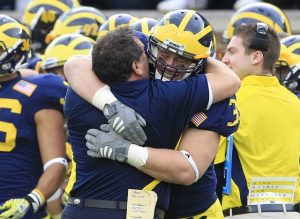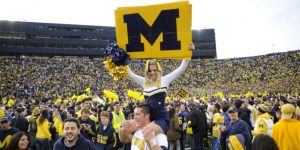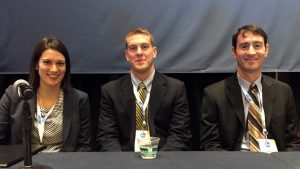Former University of Michigan Swim Captains Emily Brunemann and Kally Fayhee discuss the importance of treating mental health issues like we treat physical ones, and how asking for help is a sign of strength.
Check out the SwimSwam article here.
Former University of Michigan Swim Captains Emily Brunemann and Kally Fayhee discuss the importance of treating mental health issues like we treat physical ones, and how asking for help is a sign of strength.
Check out the SwimSwam article here.
 Original story on University Herald
Original story on University Herald
By Russell Westerholm
It was after a football practice one day that Will Heininger first let anyone know he was depressed.
His interaction with a team athletic trainer that day led him to seek help, but it was Aug. and the 19-year-old defensive lineman had been harboring a secret all summer. Will made the University of Michigan football team as a walk-on, but earned a scholarship going into his second season.
“He put his arm around me, and said ‘you’re going to be just fine, just come with me and we’ll take care of you,'” Will, 26, told University Herald of his encounter with the athletic trainer. “He walked me inside Schembechler Hall and into a woman named Barb Hansen’s office.”
Kally Fayhee, now 23, told University Herald she first noticed she was losing sleep sometime during her junior year at Michigan. The captain of the swimming team at the time, Kally would later identify what she was going through as bulimia.
Her grades did not suffer, but that only made hiding her condition easier.
“You can struggle internally with an eating disorder without anyone knowing and that’s the terrifying part of it,” Kally said.
Read the original story on Huffington Post:

By Alexandra Svokos
Will Heininger, a sport management major at the University of Michigan, was living what was supposed to be a dream. He was playing football for UM, a school that shapes the entire character of Ann Arbor, the city where Heininger grew up. But at 19, he found himself struggling with depression — not that he knew to call it that, at the time. What he knew was that he had “no motivation” and could find “no pleasure in anything,” as he would later describe it.
“It’s wonderful to play a sport collegiately, but only if it’s a positive experience in your life,” Heininger told The Huffington Post last week.
Ultimately, his athletic trainer realized that Heininger was struggling and set him up with a therapist.
“My life went from 100 to zero, and then to better than ever after getting help and understanding what depression is and how common it is,” Heininger said.
Heininger graduated in 2011. Three years later, he returned to UM to help develop Athletes Connected, a program that helps guide the school’s athletes to any mental health resources they may need.
Athletes Connected was created this past spring after the NCAA awarded the university an Innovations in Research and Practice Grant to create a “model program for supporting the mental health of student athletes.” The program is a collaboration between the university’s School of Public Health, its Athletic Department and its Depression Center, which specializes in depression research.
Although college athletes tend to receive good physical care, their mental well-being is not always seen as a priority.
From The Michigan Daily:
By Katie Penrod
The University is piloting a new program designed to draw attention to the mental health for student-athletes.
The program, which was piloted in the fall and included a public service videos and drop-in counseling sessions, drew participation from 90 percent of the University’s 931 student-athletes.
The program, which is a collaboration between the Athletic Department, the School of Public Health and the University’s Depression Center, is supported by an $50,ooo NCAA grant.
The pilot consisted of presentations that showed two videos in which two former student-athletes, former football player Will Heininger and former swimmer Kally Fayhee spoke about coping skills and their experiences with mental health.
The original story from MGoBlue is Part 2 | Read Part 1

By Steve Kornacki
NATIONAL HARBOR, Md. — Thursday afternoon (Jan. 15), in front of a packed ballroom at the NCAA Convention, it was time to share the results of the reach-out for mental health awareness and solutions at the University of Michigan.
The Athletes Connected program, funded in part by an NCAA Innovations in Research and Practice Grant, was detailed in a 10-minute presentation by former Wolverines student-athletes Will Heininger and Kally Fayhee as well as Daniel Eisenberg, associate professor of Health Management & Policy in the School of Public Health.
After videos telling the stories of Heininger and Fayhee were shown on two big screens and the trio discussed the core of the program — drop-in support groups monitored by a clinician, team presentations, video testimonials and counseling options — there was a loud round of applause from those gathered at the Gaylord National Resort & Convention Center near Washington, D.C.
“People have come up to me from Division I, Division II and Division III schools,” said Fayhee, a former U-M swimmer, “and they’re not only interested in what we have to say but in implementing the program. Getting that from a range of divisions was spectacular.”
Heininger, a football defensive lineman from 2007-11, told the audience that he hoped it could become “a sustainable model” for other universities and colleges.
“It’s one that will empower student-athletes to take control,” said Heininger, who now works with student-athletes on campus in regard to mental wellness. “When I was struggling (with anxiety and depression), just learning that this was common, after sort of being forced to open up, allowed me to get better.
“I wasn’t alone, and this happens to a lot of people. And (I discovered) a large portion of student-athletes take anti-depressant medications.That’s why reducing the stigma is so important.”